
Newsletter of the
INTERNATIONAL ENVIRONMENT FORUM
Volume 15, Number 11 --- 15 November 2013
Website: iefworld.org
Article submission: newsletter@iefworld.org
Deadline next issue 13 December 2013
Secretariat Email: ief@iefworld.org General Secretary Emily Firth
Postal address: 12B Chemin de Maisonneuve, CH-1219 Chatelaine, Geneva, Switzerland
Download the pdf version
From the Editor, Request for information for upcoming newsletters
This newsletter is an opportunity for IEF members to share their experiences, activities, and initiatives that are taking place at the community level on climate change action. All members are welcome to contribute information about related activities, upcoming conferences, news from like-minded organizations, recommended websites, book reviews, etc. Please send information to newsletter@ief.org.
Please share the Leaves newsletter and IEF membership information with family, friends and associates, and encourage interested persons to consider becoming a member of the IEF.
U.S. EPA Listening session on Carbon Pollution Standards
for Existing Power Plants
U.S. Bahá’í Office of Public Affairs, November 7, near Washington DC
The move by U.S. EPA to regulate carbon emissions from existing power plants under the Clean Air Act is potentially quite a significant step toward addressing climate change. More than 20 faith representatives were among the hundreds of individuals testifying at the Listening session, and several of them spoke during the daylong event held in Washington, DC - one of 11 held around the country as a preliminary step toward establishing standards which are to be presented in June 2014.
Peter Adriance, Representative for Sustainable Development at the U.S. Baha’i Office of Public Affairs, provided testimony at the United States Environment Protection Agency’s (EPA) Public Listening Session about the importance of reducing carbon emissions from existing power plants.
Adriance’s testimony centered around the central Baha’i principle of the oneness of humankind and the importance of this principle in many policy areas. He explained that, “It should guide us [the oneness of humankind] to seek solutions that are equitable and just, treating all people as members of one human family. I believe that to be effective, the carbon standards established by EPA over the next several months must be animated by this foundational principle.”
Learn more about the EPA’s Public Listening Sessions here: http://www2.epa.gov/carbon-pollutionstandards/public-listening-sessions
Peter’s full testimony follows:
Remarks by Peter Adriance, Representative for Sustainable Development, Baha’is of the U.S.
November 7, 2013
Good morning. I’m Peter Adriance, Representative for Sustainable Development for the Bahá'ís of the United States. I’m pleased to be among the several representatives of faith communities here speaking in strong support of EPA’s efforts to develop carbon pollution standards for existing power plants.
As President Obama has pointed out, the climate issue is not only a technical one. In his words, “We have a moral obligation to future generations to leave them a planet that is not polluted and damaged.” (The President’s Climate Action Plan, p. 4). We in the faith community would, of course, agree. But it is not only future generations that will bear the impacts of climate change. They are being felt now, most intensely by those populations around the world who are least able to cope with them. We must act with great conviction and haste to move toward solutions.
The central principle of the Bahá'í Faith is the oneness of humankind. This principle has deep implications for policy in many arenas. It should guide us to seek solutions that are equitable and just, treating all people as members of one human family.
I believe that to be effective, the carbon standards established by EPA over the next several months must be animated by this foundational principle. People of faith across the country are collaborating to reduce their emissions through energy conservation measures and the purchase of green power. They are putting their heads and hearts together to address this issue.
Today in Hartford, Connecticut, for instance, representatives of many faith communities, including Baha’is, are meeting for a Climate Stewardship Summit. Such cooperative efforts can make a difference. But this is only a part of what is needed. In order to make real progress, national policies need to be set to address major sources of emissions. The setting of carbon standards for power plants is an important move in that direction.
The Obama Administration’s release of the President’s Climate Action Plan this past June was a major step forward. As the report notes, power plants are the largest concentrated source of emissions in the United States, accounting for one-third of all domestic greenhouse gas emissions. Strong carbon standards across the board will help to substantially reduce emissions from these sources. Such standards should be based on the most recent climate science and designed to achieve the emissions reduction targets that are necessary to avoid the worst impacts of global warming.
As a father of three and someday I expect, a grandfather, my hope is that we can leave the world in better shape than we find it now, a world in which my children (indeed all children) will be able to lead safe, productive and healthy lives. Setting strong carbon standards for power plants is one critical step toward that goal. I thank EPA for its efforts in that regard.
WLGI Bahá’í Radio interviews Peter Adriance
on U.S. EPA Regulation of Carbon for Existing Power Plants
Insight on Peter Adriance and the Interfaith Sustainable Development Movement
Posted on November 13, 2013
In recent years, an interfaith environmental movement has emerged; faith communities are issuing and responding to calls to action on environmental issues such as climate change. Those involved in this interfaith movement believe that the environment, climate change in particular, is not just a scientific issue, but also a spiritual issue, a moral imperative. So, these groups have embraced and are advancing the cause of sustainable development. The Baha’i Faith is among the faiths actively involved in the movement. Among the leaders of this effort – in the Baha’i Faith in particular and in interfaith circles in general – is Peter Adriance, who is the Representative for Sustainable Development in the Baha’i Office of Public Affairs in Washington, DC.
Bhakti Larry Hough interviews Mr. Adriance in the current edition of Insight. He also speaks with Teresa Eickel, Executive Director of the Interreligous Eco-justice Network of Hartford, Conn. Her organization held a Climate Stewardship Summit last week that drew representatives from more than 20 faith groups.
You can listen to or download the show on Soundcloud here:
Insight 85: A spiritual approach to climate and the environment:
https://soundcloud.com/radiobahai/insight-85-peter-adriance
If you wish to listen, the interview with WLGI is being aired Monday, November 18 at 10AM, 7PM and midnight
EST, but will probably not be accessible after that. http://www.wlgi.org/
You can also listen online or download our interview with @faithsustain on Soundcloud:
https://t.co/coqwMJeQnR
Participation for the Second Biennial Conference of the Global Research Forum
on Sustainable Production and Consumption (GRF-SPaC)
Global Transitions to Sustainable Production and Consumption Systems
Fudan University, Shanghai, China, June 8–11, 2014
Lead Organizers. The Global Research Forum on Sustainable Production and Consumption (GRF-SPaC), in collaboration with the Fudan Tyndall Centre and the Exploring the Role of High-Emitting Groups in Accelerating the Transition to a Low-Carbon Society (HEGiATLCS) Research Program (Fudan University), the Institute for Global Environmental Strategies (IGES), the Integrated Strategies Forum (ISF), and the One Earth Initiative.
Aims of the Conference.
• To improve understanding of the complex driving forces underlying prevalent and emerging
consumerist lifestyles around the world.
• To generate insights about fostering a necessary transition toward alternative ways of pursuing
individual and societal well-being in a technological society cognizant of ecological limits.
• To contribute to establishment of a vibrant global research community focused on sustainable
production and consumption, which is able to advise policy makers, business, and civil society.
Call for Abstracts, Essays, and Session Proposals
Environmental deterioration, climate change, biodiversity loss, resource scarcity, as well as inequality and persistent poverty, are all linked to, and driven by, globally unsustainable production and consumption patterns and systems. As the traditional rules of the economic and financial system are called increasingly into question, so do the impacts of the expanding international consumer class. Developing countries are working to overcome privation by growing their economies, while the middle classes in countries such as India and China are adopting increasingly material-intensive lifestyles.
Since the 2002 World Summit on Sustainable Development, the transition to sustainable production and consumption (SPaC) systems has been heralded as a global priority. Accordingly, the United Nations General Assembly launched in 2012 the Ten-Year Framework of Programs on Sustainable Consumption and Production (10YFP). In addition, the International Human Dimensions Program (IHDP) initiated its own ten-year Future Earth research plan. The GRF–SPaC global conference will examine these and other approaches to produce the transdisciplinary knowledge and actions needed to support these activities during the coming decade.
Over the past two decades, extensive research regarding SPaC has been carried out covering issues such as the circular and green economy, the attitude-behavior gap, collaborative consumption, sustainable finance and investment, sustainable procurement, and green supply-chain management. Other work has sought to identify the underlying drivers of contemporary consumer culture and to examine the inherent problems with the prevailing economic growth paradigm. Emerging from this activity is appreciation for the complex challenges of systemic change, though actual progress is hindered by our limited comprehension of the multidimensional barriers that impede diffusion of more sustainable lifestyles and consumer practices. Further inquiry is necessary to understand these complexities and to more effectively guide the transition from research to policy.
This conference provides a unique opportunity for Chinese and Asian SPaC researchers and practitioners to join together with others in the global community. The Second GRF–SPaC conference will be a forum to present and discuss new research outcomes from the Asia-Pacific region, as well as from Latin America, Africa, Europe, and North America. The event will take stock of new issue framings and explore emerging research questions. The scope will cover local and global issues and interconnections across scales, linking regions and researchers. One of the aims is to strengthen the international community of SPaC researchers and practitioners and to open channels of communication with knowledge users in policy making, business, and civil society.
The conference will entail several keynote presentations by internationally renowned scholars and policy makers, academic papers and discussions, and dialogue sessions between researchers and practitioners. The format will integrate across regions and seek to forge global collaborations with other global networks. We invite interested participants to submit abstracts for papers and essays as well as session proposals.
Conference Co-Chairs
Dr. Maurie COHEN, Associate Professor and Director, Program in Science, Technology, and Society, New
Jersey Institute of Technology (USA)
Professor Trevor DAVIES, Director and Chair, Fudan Tyndall Centre, Fudan University (China) and Pro-Vice
Chancellor, University of East Anglia (UK)
Professor REN Yuan, School of Social Development and Public Policy and Deputy Director, Institute of
Population Research, Fudan University (China)
Professor dr. Philip VERGRAGT, Professor Emeritus, TU Delft (Netherlands), Research Professor, Clark
University (USA), and Fellow, Tellus Institute (USA)
Contact Information. For further information, please visit the conference website at https://www.confmanager.com/main.cfm?cid=2724. Or write to: pvergragt@tellus.org
Asia-Europe Seminar on Human Rights and the Environment
At a time when many question the effectiveness of international processes, it is refreshing to discover a major intergovernmental dialogue without a formal structure. The Asia-Europe Meeting (ASEM) is a forum to promote dialogue and cooperation among 49 states, the ASEAN Secretariat and the European Commission on all issues of common interest to Asia and Europe. Summit meetings of Heads of State and Government are held every two years, with other meetings at ministerial level, and informal seminars and projects cover fields such as economy, environment, public health, arts and culture, education, human rights and governance, and intercommunal dialogue. The only formal structure is the Asia-Europe Foundation (http://www.asef.org/) which helps to implement specific projects.
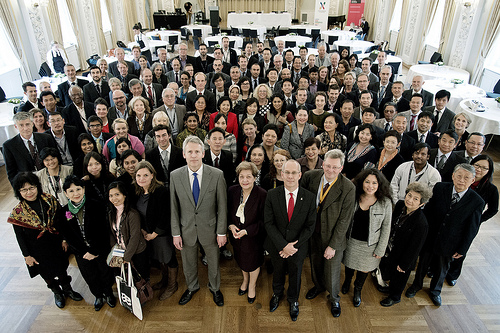
ASEM Seminar on Human Rights and the Environment
The 13th Informal ASEM Seminar on Human Rights in Copenhagen, Denmark, on 21-23 October 2013 focused on Human Rights and the Environment. It brought together over a hundred experts from governments and civil society from across the two regions. The seminar in historic Moltkes Palace was opened by the Danish Minister of the Environment and closed with a statement from the Danish Foreign Minister. Four working groups discussed 1) the interaction between sustainable development, environment and human rights; 2) access to information, participatory rights and access to justice; 3) actors, institutions and governance; and 4) climate change and human rights implications.
IEF President Arthur Dahl was one of the invited experts, and was able to contribute actively to the seminar deliberations, especially on climate change, migration and human rights, based on earlier IEF contributions to the UN Human Rights Council Social Forum on Climate Change and Human Rights, and to Rio+20 and the post-2015 agenda. He also contributed to a side event on "Climate Change and Indigenous Peoples" organized by the Danish Institute for Human Rights.
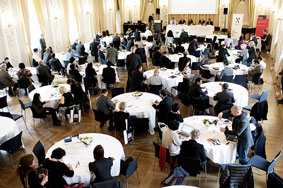 .
. 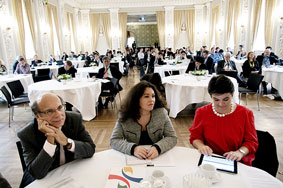 .
. 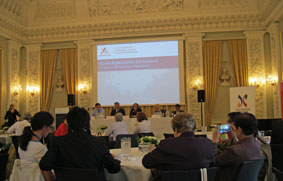
The seminar in plenary
It was apparent that the human rights community and the environmental movement had long followed parallel paths with little interchange, and the seminar allowed each to discover many common concerns and interests. Environmental challenges like climate change are aggravating many human rights concerns, and attention to the human rights dimension could free environmental issues from the marginalization to which they are often subjected. However human rights mechanisms are based on national responsibility, while many environmental problems are transboundary or international. The climate change negotiations have focused on scientific issues, with little attention to human impacts. Human rights mechanisms cannot deal with global victims and future generations. Climate-induced migration will be an enormous challenge which requires anticipatory action rather than waiting for disasters to happen. Education on the issues, and legislation are both necessary.
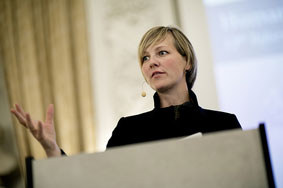 .
. 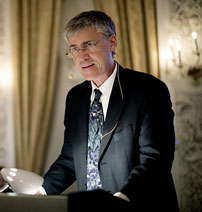 .
. 
Ida Auken, Danish Minister of the Environment; John Knox, UN Independent Expert
on Human Rights and Environment; Moltkes Palace
John Knox, the UN Independent Expert on Human Rights and Environment, will be reporting in March 2014 to the Human Rights Council. Issues that need further consideration include the importance of a specific right to a healthy environment, the obligations of states with respect to transboundary effects, the ways different types of human rights and environmental institutions might support one another, and the responsibilities of the private sector. There may be a need for a new instrument on human rights and the environment to fill some of the significant gaps in existing mechanisms. The report of the seminar will be presented to all the ASEM governments.
For more information, background documents and reports, see http://www.asef.org/index.php/projects/themes/human-rights/2938-13th-in…. For additional photos, see http://yabaha.net/dahl/travel/t2013/Copenhagen/Copenhagen.html.
Ninth ECPD International Conference
Belgrade, Serbia, 11-12 October 2013
The European Center for Peace and Development (ECPD), affiliated with the University for Peace established by the United Nations, celebrated the 30th anniversary of its creation by the UN General Assembly in 1983 at its Ninth ECPD International Conference in the City Hall in Belgrade, Serbia, on 11-12 October 2013. The IEF has been a partner of ECPD for a number of years and IEF President Arthur Dahl sits on its Academic Council. The 190 participants included many diplomats and professors from across the Western Balkans and around the world.
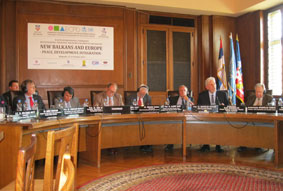 .
. 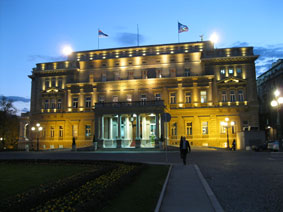
ECPD Conference - Belgrade City Hall
The conference for national and inter-ethnic reconciliation, religious tolerance and human security in the Balkans had as its theme this year "New Balkans and Europe: Peace, Development, Integration". It was opened with a message from former UN Secretary-General Boutros Boutros-Ghali. In the keynote speeches, Prof. Johan Galtung, Founder of the Peace Research Institute, Norway, suggested the Balkans could play a bridging role between EurAsia and the Euro-Atlantic partnership. Prof. Erhard Busek, Former Vice-Chancellor of Austria and Special Coordinator of the Stability Pact for South-Eastern Europe, discussed religious challenges in the region and the tension between secular and fundamentalist movements. While western Europe had lost its spirit of solidarity, with everyone looking out for themselves, the young generation had a desire for values. He warned that peace was not yet guaranteed in the region, and that academic and civic movements should address this without waiting for politicians. Ambassador Prof. Darko Tanaskovic of the University of Belgrade noted the importance of sustainable development, but that politicians wanted to hide this from the people. Young people were running away from the region because they could not find happiness there. Arthur Dahl gave a paper on "New Balkans Sustainability and the Post-2015 Development Agenda" which is available at https://iefworld.org/ddahl13e pending publication in the proceedings of the conference.
Among the sensitive issues discussed were the moral and political weakness in the European Union, the rise of nationalism and xenophobia, the persecution of the Roma peoples, the tension between Serbia and Kosovo, the radicalization of relations within religious communities and the interference of politics in religion, all in the context of the need to strengthen reconciliation and solidarity.
The main conference was followed by two round tables, one a youth forum and one on "Whither the Global South in the 21st Century".
Multilateral development banks deliver US$ 27 billion in climate change financing
The World Bank http://www.worldbank.org/en/topic/climatechange
Svitlana Pyrkalo, 14 November 2013
Multilateral development banks (MDBs) provided almost US$ 27 billion worldwide, in financing to address the challenges of climate change in 2012, according to the second joint MDB report on climate finance. The report was released today, in line with the commitment by MDBs to enhance the transparency of their investments in climate change mitigation and adaptation.
The report analyses the financial commitments by the institutions to support climate change mitigation and adaptation, and the information provided has been expanded since the first edition to include better sectoral and regional breakdowns of MDB financing.
Of the total US$ 27 billion in climate finance, 78 per cent – or over US$ 21 billion – was dedicated to mitigation, while 22 per cent – or nearly US$ 6 billion – was applied to adaptation. Of the total commitments, 8 per cent – or US$ 2 billion – came from external resources, such as bilateral or multilateral donors, including the Global Environment Facility and the Climate Investment Funds.
In terms of regional coverage, Latin America and the Caribbean received the highest share of MDB climate finance (18 per cent of total funds), while the EU-13 countries received 11 per cent. Sub-Saharan Africa received almost equal amounts of adaptation and mitigation finance (14 per cent of total funds, representing 31 per cent of total adaptation finance and 8 per cent of total mitigation finance). In regards to sector coverage, 36 per cent of adaptation finance went to the infrastructure, energy and built environment sector, while 34 per cent went towards increasing the agriculture sector’s resilience to climate change. Renewable energy took by far the largest share of mitigation finance, with 36 per cent. The discrepancy between mitigation and adaptation finance is greatest in the EU-13 and other European and Central Asian regions: 96 per cent of total climate finance commitments were applied to mitigation measures in the EU-13 countries; while 94 per cent of the total funds were applied to mitigation in other European and Central Asian regions.
Notes:
The report was prepared by a group of MDBs: the African Development Bank (AfDB), the Asian Development
Bank (ADB), the European Bank for Reconstruction and Development (EBRD), the European Investment Bank
(EIB), the Inter-American Development Bank (IDB), the World Bank (WB) and the International Finance
Corporation (IFC).
The report can be downloaded at http://www.ebrd.com/downloads/sector/sei/climate-finance-2012.pdf. Questions relating to the report should be addressed to: jointclimatefinancereport@ebrd.com
Protecting Snow and Ice Critical for Development, Climate
November 3, 2013
Each year, the snow line on the Himalayan and Andean mountain slopes continues to creep up, exposing brown dirt where 50 years ago there was always snow. Communities downstream from those majestic peaks now watch as big lakes formed by melting glaciers cause catastrophic floods in some areas, while lack of snow melt leads to crippling drought in others.
At the same time, 4 million people perish each year from the smoke they inhale from open-fire cooking – soot that also rises into the atmosphere and speeds up the melting of ice and snow.
Pollution from open fires and diesel engines (known as black carbon), and methane gas released from livestock, landfills and mining operations; are some of the pollutants scientists say must quickly be curtailed to protect human welfare and tackle climate change.
A new scientific report shows that by moving rapidly to reduce such short-lived climate pollutants (SLCP), we could slow the warming in critical snow and ice-covered regions with multiple benefits as a result.
“An issue of global concern”
Scientists call snow-capped mountain tops, brilliant blue glaciers, regions with permafrost and other perpetually frozen parts of Earth the “cryosphere.” Such areas feed major rivers that provide freshwater for hundreds of millions of people, trap harmful greenhouse gases, and keep sea levels where they should be.
The new report, On Thin Ice: How Cutting Pollution Can Slow Warming and Save Lives, produced by the Bank and the International Cryosphere Climate Initiative (ICCI), issues dire warnings.
A continued warming in the cryosphere could cause a rise in sea levels that would affect more than 100 million people globally. It would also threaten water resources on which 1.5 billion people just in the Himalayan region depend, and a loss of frozen soil (permafrost) that that would then release as much as 30 percent more carbon into the atmosphere by 2100.
“The cryosphere is changing fast as a result of climate change and if warming continues unabated, the risks to human societies and sensitive ecosystems rise dramatically,” said ICCI Director Pam Pearson. “It makes slowing cryosphere warming an issue of global concern.”
“This report is an important contribution to the World Bank's work on development and climate. It clearly identifies the risks to the poorest and most vulnerable, but also the climate benefits of early, scalable action irrespective of global agreements."
Rachel Kyte, Vice President for Sustainable Development, The World Bank
http://www.worldbank.org/en/news/feature/2013/11/03/protecting-snow-ice…
Tightening vehicle and fuels standards to benefit global health and climate
Study finds that more stringent standards worldwide could dramatically reduce premature mortality while cutting short-lived climate pollutant emissions as much as 80 percent.
UNEP, Wed, Nov 13, 2013
Simply extending the vehicle emissions and fuel-quality standards already in force in the largest vehicle markets throughout the rest of the world could reduce the number of premature deaths caused annually by fine particle emissions by 75 percent in 2030, according to a report released today by the International Council on Clean Transportation (ICCT).
Moreover, The Impact of Stringent Fuel and Vehicle Standards on Premature Mortality and Emissions finds that doing so would have the added benefit of reducing near-term climate impacts through reductions in black carbon and other short-lived climate pollutants by the equivalent of 710 million metric tons of carbon dioxide annually.
The World Health Organization has identified air pollution as one of the top global risk factors for premature death, responsible for more than 3.2 million early deaths in 2010. Vehicles are a major source of outdoor air pollution. The report quantifies a subset of their health impacts the effects of direct tailpipe emissions of fine particles (less than 2.5 microns in diameter) on premature mortality in urban areas and finds that policy action can avert more than 210,000 early deaths in 2030.
The methodology of this study results in a lower bound estimate because it only captures primary particle emissions from on-road vehicles in urban areas. The study’s estimate of premature mortality and public health benefits would be substantially increased if additional impacts were included, such as exposure to secondary pollutants formed in the atmosphere (including particles and ozone), emissions in rural areas and emissions from marine, aviation, and off-road equipment.
Thus, these results should be used as highly conservative estimates that do not reflect the full contribution from clean fuel and vehicle standards in the future.
The problem is particularly acute in the rapidly developing regions of China and India and in emerging markets, which now account for the majority of vehicle pollutant emissions and attendant health impacts. The study found that unless tighter controls on those emissions are put in place, the number of early deaths will increase by 50 percent globally between now and 2030, with China, India, and other countries in Asia-Pacific, Africa, and the Middle East accounting for more than 85 percent of all these premature deaths.
Stringent regulations implemented in Europe, the United States, Canada, Japan, Australia and South Korea have proven highly effective at curbing pollution from vehicles. By controlling vehicle tailpipe emissions of harmful compounds like nitrogen oxides, sulfur oxides and particulate matter, as well as fuel sulfur content, these standards will reduce premature mortality related to vehicle emissions in these regions by 80 percent to 90 percent below year 2000 levels in 2030. Low-sulfur fuels are a key factor in controlling pollutant emissions because fuels with higher sulfur content not only emit more particulates but also inhibit the use of aftertreatment devices such as particulate filters.
“This analysis clearly demonstrates how cleaner fuels and vehicles are saving lives in the U.S. and Europe”, said Dan Greenbaum, president of the Health Effects Institute and Chairman of the Board of the ICCT, adding: “It is time to extend these benefits to the rest of the world”.
The ICCT report lays out a global policy roadmap aimed at significantly altering regional trends in pollution and mortality by accelerating the spread of improved vehicle emissions and fuel-quality regulations. The goal, the report’s authors argue, should be tailpipe emission standards equivalent to the most stringent adopted in Europe, so-called Euro 6/IV standards, in tandem with ultra-low-sulfur fuel (no more than ten parts per million sulfur), by no later than 2025.
Countries on the African continent and in the Middle East, with much earlier or no standards in place, are expected to take longer to reach these standards but can still significantly reduce health impacts over the same period by moving through some of the interim regulatory steps.
Committing to the roadmap laid out in the report could reduce early deaths from vehicle emissions by 75 percent in 2030. “This is an aggressive policy path, no question”, said ICCT Program Director Kate Blumberg, one of the report’s coauthors. “But it’s achievable, based on our assessment of technical feasibility, local capacity, and international experience.”
The report comes as governments gather in Warsaw, Poland, for the opening of the 19th Conference of the Parties to the UN Framework Convention on Climate Change, with the aim of putting in pathways to a new universal agreement by 2015. A comprehensive study released in January 2013 in the Journal of Geophysical Research found black carbon to be the second largest contributor to climate warming from human activities. And in September 2013, the Intergovernmental Panel on Climate Change (IPCC) highlighted new findings on the strong climate impacts of short-lived climate pollutants such as black carbon.
The IPCC report found that one kilogram of black carbon causes as much climate impact in the near term as 3,200 kilograms of carbon dioxide. Diesel vehicles, in particular, are a prime target for policies aimed at controlling black carbon.
“The policy roadmap laid out in this report saves lives and reduces climate impacts at the same time”, said Ray Minjares, co-author and lead of the ICCT’s Program on Climate and Health. “The near-term climate benefits from cleaning up fuels and vehicles at the global level are equivalent to annual the carbon dioxide emissions from cars on the road in Europe today”, he added.
Achim Steiner, United Nations Under-Secretary-General and UN Environment Programme (UNEP) Executive Director, said: “This report by the ICCT provides further compelling evidence on the significant health and climate benefits from addressing emissions such as black carbon or ‘soot’ from sectors including transportation. While this should not deflect international and domestic attention from the urgency to bring down the principle greenhouse gas carbon dioxide fast action on black carbon and other short-lived pollutants represent strong, supportive and complimentary measures towards a range of sustainability goals that can touch lives everywhere”.
Cleaner fuels and vehicles are a good investment, the report’s authors point out. “The U.S. EPA has estimated that its regulations to clean up the diesel truck fleet will reap US $17 in benefits to the American public for every dollar of investment,” said ICCT Program Lead Cristiano Façanha. “In China, where national officials are working to avoid the next ‘airpocalypse’, vehicle emission controls could reap US $150 billion in public health benefits at an even lower cost than programmes in the United States. Experience shows these investments in public health consistently return a profit to society.”
The Impact of Stringent Fuel and Vehicle Standards on Premature Mortality and Emissions is the second major report in the ICCT’s Global Transportation Roadmap Series. The first, Global Transportation Energy and Climate Roadmap, evaluated the impacts of transportation policies on global oil consumption and greenhouse gas emissions. Download the report and related materials at www.theicct.org/global-health-roadmap.
The International Council on Clean Transportation is an independent nonprofit organization founded to provide first-rate, unbiased research and technical and scientific analysis to environmental regulators. The ICCT participants’ council comprises high-level civil servants, academic researchers, and independent transportation and environmental policy experts, who come together at regular intervals to collaborate as individuals on setting a global agenda for clean transportation. Founded in 2005, the ICCT maintains offices in Berlin, Brussels, China, and London, as well as in the U.S. It is funded principally by private foundations, such as the Hewlett Foundation and ClimateWorks in the United States and Stiftung Mercator in Europe, and is a non-state partner organization in the Climate and Clean Air Coalition to Reduce Short-Lived Climate Pollutants.
United Nations Environment Programme http://www.unep.org/
'As people of faith we have no choice, we must': Bishop Zac urges action
Alliance of Religions and Conservation, 3 November 2013
In a world of fudge, compromise and half truths, Uganda’s Anglican Bishop Rt. Rev. Zac Niringiye offers a laser-sharp clarity that is as inspiring as it is challenging.
Bishop Zac, as he is fondly known, gave up his career as a physicist to enter the Church. In June 2012 he retired from his position as Assistant Bishop of Kampala Diocese to follow a new calling – the fight against corruption.
He has challenged Christians all over Africa to stand up and fight against practices that are “soiling the fabric of many countries” on the continent. As he says: “The problem with this world is this: some are eating from the top of the table, some are eating from underneath, and some are watching from afar.”
Bishop Zac has been called one of the foremost evangelical Christian thinkers/theologians today. So it was a great honour that he agreed to make the keynote address at the launch of the Uganda Faiths Network on Environmental Action (UFNEA) in Kampala last week.
God is not pleased
And in typical Bishop Zac form, he addressed the issue of environmental degradation and the failure of us all – including the faiths – to protect God’s Creation with searing honesty.
God is not pleased, he told around 160 participants, because what he sees is destruction rather than sustainable use of the environment.
“When children die the way they do in this country because of diarrhoea, because of dysentery, because of cholera, because of malaria, because of environmentally related diseases that are preventable, God is not happy,” he said.
“When trees are cut, consequently floods rage and then the waters overtake human beings and they die, God is not happy. The point I’m really making is God owns Creation. For us to pander to destroy it, to work it in a way that is not sustainable, is not pleasing to God, is not holy, is not actions of faith.
“Sadly, the people of faith, we have shown the world we don’t believe in God. Why? We say we believe in God but do not care about His Creation. We say we believe in God and participate in destroying what God has made.
“We say we believe in God and when it comes to speaking about nature, environment, creation care, hills and valleys, let me tell you we are complicit, sadly, in the process of destroying the beauty that God has made.”
Faith will save us
Yet if we have been slow to understand the dual responsibility of stewardship – to care for the land as well as working it – it is faith itself that shows us the way back to protecting Creation, he said, which is why the launch of the Uganda Faiths Network on Environment Action was so important.
“That is why this is a milestone event," he said. "That together from our different faith traditions we can say ‘we disagree on many things but we can agree on this. That this Creation, somebody owns it and it’s not us'. And you know He owns it for us, for posterity, for those who have gone before us. We can say that.”
This truth was a marker, he said: “This truth is the basis, is the ground on which we stand. It is the very ground of faith, it’s the ground on which we can stand and engage with courage and boldness about matters of the environment. It is big, it is crucial, it is important.
"We, therefore, of all people should be able to say we are committed to ensure Creation care, environment conservation. Why? Because we have a mandate, it behoves us from our faith in God."
Despite the challenges ahead, Bishop Zac said it was possible to reverse the degradation. “It is possible to clean our air, it is possible. It is possible to clean Lake Victoria, it is possible to plant trees. "It is possible, we can. In fact, not only is that true, we must, we must. We have no choice. As people of faith, we have no choice. We must.”
Alliance of Religions and Conservation News http://www.arcworld.org/
Hindus announce the first Hindu Environment Week next February
October 29, 2013:
International Hindu environmental network The Bhumi Project is calling on
Hindu communities around the world to participate in the first Hindu
Environment Week in February 2014.
The planned annual week of celebration and actions is expected to involve thousands of Hindus in communities, schools and temples world-wide. It was launched in Varanasi, Uttar Pradesh at a special event organised by the Bhumi Project and hosted by the Mayor of Varanasi, Mr Ram Gopal Mohale. Special guests included a representative from the Kashi Viswanath temple and Prof. Rana PB Singh of Banaras Hindu University.
The Bhumi Project hopes that this annual opportunity to think about the environment will be a time for Hindus to celebrate the natural world, whilst reflecting and committing themselves to increasing their responsibility towards the environment. Gopal Patel, who heads the Bhumi Project and was present at the launch, commented, “By having an annual week of events dedicated to the environment, we hope that Hindus the world-over will feel inspired to make practical changes in their lives that have a positive effect on the environment.”
Some of the events penciled in for the week-long celebration include conferences, exhibitions, and special eco-events in Indian towns and cities as wide-spread as Rishikesh, Mt Abu, Puri, Mumbai, Srinagar and Varanasi. Some places are choosing to launch environmental assessments of their surrounding areas; the Bhumi Project itself will be launching a Green Temple Handbook. During the week there will be also be a formal launch in India of the story and script of The Hidden Forest in English and Hindi. This is a comic but informative narrative that tells the story of three generations of girls and women who go on pilgrimage in Braj - and how their pilgrimage journey involves assessing their own relationship with the natural world.
A focus of the week will be the environmental challenges many of India’s pilgrim sites are facing. Events are currently being planned by members of the Green Pilgrimage Network in India, a new green collaboration which the Bhumi Project has worked to develop in partnership with ARC (the Alliance of Religions and Conservation).
“In the last two decades pilgrim sites in India have seen significant increases in numbers of pilgrims which has lead to many environmental problems. If we are to preserve them for future generations, then we need to seriously consider the environmental impact of each yatra, or pilgrimage, we undertake.” commented Shaunaka Rishi Das, Director of the The Oxford Centre for Hindu Studies.
UN Post-2015 Reports
Following the United Nations Conference on Sustainable Development (UNCSD), or Rio+20, in Rio de Janeiro in June 2012, and with the expiration of the Millennium Development Goals in 2015, the international community has launched a vast debate on the priorities and directions for a Post-2015 Agenda. This debate bridges the aim by the development community to reduce poverty, and the concerns of the environmental community to stay within planetary boundaries and achieve sustainability. There is a need to extend the Millennium Development Goals and to create Sustainable Development Goals as agreed at Rio+20 while merging the two processes.
In support of this debate, and using the Internet to reach more widely in consulting the public and civil society organizations, many different processes have been set in motion within the UN system and as submissions for consideration by the UN. It is hard to keep up with all the different processes, but the list of reports below as of October 2013 may help those who want to follow the main lines of the debate.
GENERAL REPORTS
High-Level Panel on Post-2015 Development Agenda. 2013. “A New Global Partnership: Eradicate Poverty and Transform Economies through Sustainable Development”. Report of the High-Level Panel of Eminent Persons on the Post-2015 Development Agenda, 30 May 2013. http://www.post2015hlp.org/
Sustainable Development Solutions Network. 2013. “An Action Agenda for Sustainable Development: Report for the UN Secretary-General”. Prepared by the Leadership Council of the Sustainable Development Solutions Network, 6 June 2013. 50 p. http://www.unsdsn.org
United Nations. 2013. "The Millennium Development Goals Report 2013". New York: United Nations, June 2013. 60 p. http://mdgs.un.org/unsd/mdg/Resources/Static/Products/Progress2013/Engl…
United Nations Development Group. 2013a. "The Global Conversation Begins: Emerging Views for a New Development Agenda". 20 March 2013. http://www.worldwewant2015.org/the-global-conversation-begins
United Nations Development Group. 2013b. “A Million Voices: The World We Want: A Sustainable Future with Dignity for All”. 159 p. http://www.worldwewant2015.org/millionvoices
United Nations System Task Team on the Post-2015 Development Agenda. 2012. "Realizing the Future We Want for All: Report to the UN Secretary-General". July 2012. http://www.un.org/en/development/desa/policy/untaskteam_undf/untt_repor…
UN Secretary-General's Report to the General Assembly Special Event, September 2013. “A life of dignity for all: accelerating progress towards the Millennium Development Goals and advancing the United Nations development agenda beyond 2015". United Nations A/68/202, 26 July 2013. 19 p. http://www.un.org/millenniumgoals/pdf/A%20Life%20of%20Dignity%20for%20A…. Overview at http://www.un.org/millenniumgoals/pdf/SG_Report_MDG_EN.pdf
United Nations Global Compact. 2013. “Corporate Sustainability and the United Nations Post-2015 Development Agenda: Perspectives from UN Global Compact Participants on Global Priorities and How to Engage Business Towards Sustainable Development Goals”. Report to the UN Secretary-General, 17 June 2013. 25 p. http://www.unglobalcompact.org/docs/news_events/9.1_news_archives/2013_…
UNDP. 2012. “Powerful Synergies: Gender Equality, Economic Development and Environmental Sustainability”. United Nations Development Programme, September 2012. 200 p. http://www.undp.org/content/dam/undp/library/gender/f_PowerfulSynergies…
REPORTS OF THEMATIC CONSULTATIONS
UN System agencies with various governments and other partners organized thematic consultations on major issues for the post-2015 development agenda: Conflict, Violence and Disaster; Education; Energy; Environmental Sustainability; Food Security and Nutrition; Governance; Growth and Employment; Health; Inequality; Population; Water. Not all have produced summary reports on the main web site: http://www.worldwewant2015.org/. Those that have are listed below.
UNDP/UNEP. 2013. “Breaking Down the Silos: Integrating Environmental Sustainability in the Post-2015 Agenda”. Report of the Thematic Consultation on Environmental Sustainability in the Post-2015 Agenda. France/Costa Rica, UNDP/UNEP. August 2013. 38 p. http://www.worldwewant2015.org/sustainability2015report
Making Education a Priority in the Post-2015 Development Agenda http://www.worldwewant2015.org/node/389575
Final Report of the Global Thematic Consultation on Governance and the Post-2015 Development Framework http://www.worldwewant2015.org/governance/finalreport
Synthesis Report on the Global Thematic Consultation on Addressing Inequalities http://www.worldwewant2015.org/node/299198
Overview and Key Messages from the Report on the Inequalities Consultation http://www.worldwewant2015.org/node/308651
Final Report: Consultations on Growth and Employment http://www.worldwewant2015.org/node/392756
The Final Post 2015 Water Thematic Consultation Report http://www.worldwewant2015.org/node/366798
Population Dynamics in the Post-2015 Development Agenda http://www.worldwewant2015.org/population
Health in the post-2015 development agenda http://www.worldwewant2015.org/health
Hunger, food and nutrition security: towards a post-2015 development agenda http://www.fao.org/fsnforum/post2015/ and http://www.worldwewant2015.org/food2015
04.09.2013 Energy Consultation - Summary Compilation.pdf http://www.worldwewant2015.org/node/338765 http://www.worldwewant2015.org/Energy2015
Conflict, Violence and Disaster in the Post-2015 Development Agenda http://www.worldwewant2015.org/conflict
Report of the Expert Meeting on Accountability Framework for Conflict, Violence and Disaster in the Post-2015 Development Agenda http://www.worldwewant2015.org/node/371755
Most of these reports can be found at http://www.worldwewant2015.org/sustainability2015
SOME REPORTS FROM OUTSIDE THE UN SYSTEM
European Report on Development. 2013. “Post-2015: Global action for an Inclusive and Sustainable Future”. Brussels: European Center for Development Policy Management, the Overseas Development Institute, and the German Development Institute (DIE). http://www.erd-report.eu/erd/report_2012/documents/FullReportEN.pdf
Helliwell, John, Richard Layard and Jeffrey Sachs (eds). 2013. World Happiness Report 2013. New York: Sustainable Development Solutions Network and Earth Institute, Columbia University. 154 p. http://unsdsn.org/files/2013/09/WorldHappinessReport2013_online.pdf
Updated 16 November 2013
|
